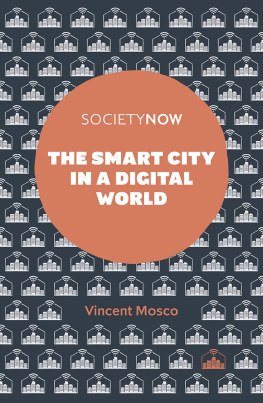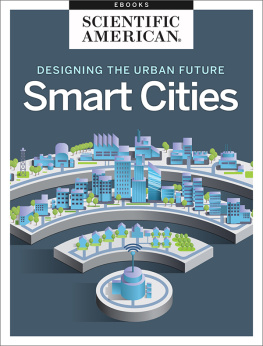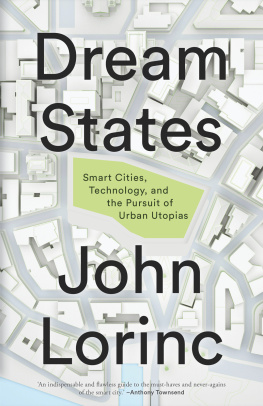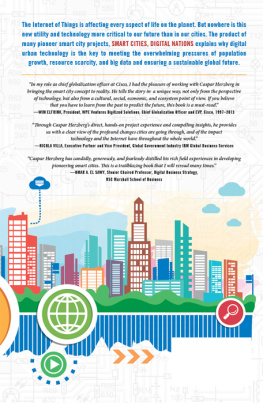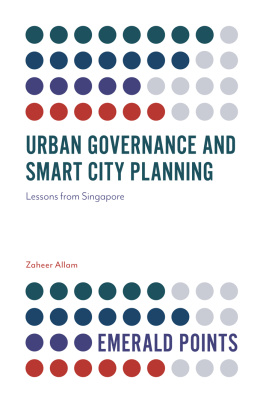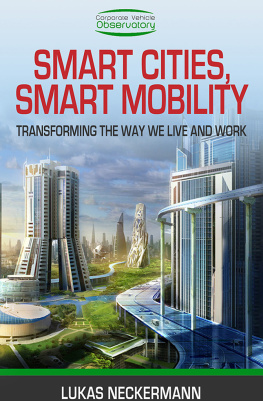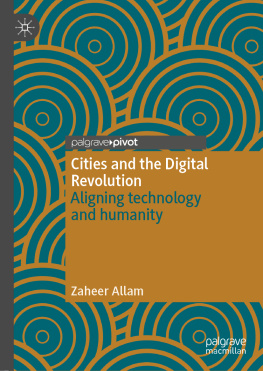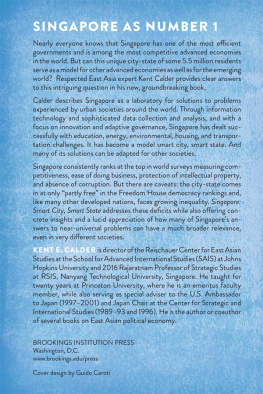THE SMART CITY IN
A DIGITAL WORLD
THE SMART CITY IN
A DIGITAL WORLD
VINCENT MOSCO

United Kingdom North America Japan India
Malaysia China
Emerald Publishing Limited
Howard House, Wagon Lane, Bingley BD16 1WA, UK
First edition 2019
Copyright 2019 by Emerald Publishing Limited.
Reprints and permissions service
Contact:
No part of this book may be reproduced, stored in a retrieval system, transmitted in any form or by any means electronic, mechanical, photocopying, recording or otherwise without either the prior written permission of the publisher or a licence permitting restricted copying issued in the UK by The Copyright Licensing Agency and in the USA by The Copyright Clearance Center. No responsibility is accepted for the accuracy of information contained in the text, illustrations or advertisements. The opinions expressed in these chapters are not necessarily those of the Author or the publisher.
British Library Cataloguing in Publication Data
A catalogue record for this book is available from the British Library
ISBN: 978-1-78769-138-4 (Print)
ISBN: 978-1-78769-135-3 (Online)
ISBN: 978-1-78769-137-7 (Epub)

To my father Frank Mosco, whose devotion to the New York City he loved earned a new name for the Manhattan block we lived on: Mosco Street.
To my grandparents Lucy and Vincent DiPilato. Immigrants to America. Driven out of the coal-mining town of Barton, Maryland by the Ku Klux Klan. Planned a return to Italy. Stopped off in New York City. Made a life.
Id got a bit o the brave by now an I asked our visitor why Prescients with all their high Smartnall want to learn all bout us Valleysmen. What could we possbly teach her what she dint know? The learnin mind is the livin mind, Meronym said, an any sort o Smart is truesome Smart, old Smart or new, high Smart or low.
David Mitchell, Cloud Atlas: A Novel
CONTENTS
LIST OF TABLES
Chapter 1
Chapter 7
ABOUT THE AUTHOR
Vincent Mosco is Professor Emeritus, Queens University, Canada where he held the Canada Research Chair in Communication and Society. He is also Distinguished Professor, New Media Centre, School of Journalism and Communication, Fudan University, Shanghai. He is the author or editor of 26 books and over 200 articles and book chapters on communication, technology and society including The Digital Sublime, The Political Economy of Communication, To the Cloud: Big Data in a Turbulent World and Becoming Digital: Toward a Post-Internet Society.
ACKNOWLEDGEMENTS
I am deeply grateful to many people for helping to make this book possible. Catherine McKercher, my partner in life and in research, used her considerable skills as a journalist to improve my first book manuscript, published in 1979, and, 40 years and 25 books later, she was a source of intelligent comment and practical advice on this project. In fact, most of this book was written at one end of a sofa whose other end was occupied by Catherine, hard at work on her own book, keyboard taps interrupted from time to time with questions and advice. Catherine read and commented on drafts of the book proposal and offered valuable suggestions throughout.
I am indebted to Patricia Mazepa, Ian Nagy, Alex Savulescu and Sandra Smeltzer, who also commented on drafts of the book proposal. My deep gratitude goes out to Ian and Alex, who also read and offered constructive criticism on a complete draft of the manuscript. Patricia and Enda Brophy also provided helpful suggestions throughout the writing. I have discussed cities with Ying-Fen Huang for many years and am grateful for her advice, particularly on urban development in China. Manjunath Pendakur, a dear friend and colleague for 40 years, offered insights on information technology in India. Thanks also to my childhood friend Lawrence Venturato, a fellow Mulberry Street kid, who shared his thoughts about a changing New York City.
My projects often benefit from the experience and knowledge of family members and The Smart City in a Digital World is no exception. Not many people know more about Disney than my daughter Madeline Mosco and her partner Derek Morton. Visits with them to the happiest place on earth and conversations about Disneys vision helped me to understand the companys significant impact on urban design and planning. Through numerous conversations over many years, my daughter Rosemary Mosco, a science communicator and author, schooled me on the significance of climate change, an issue that is all too often ignored or mentioned only briefly in discussions of smart cities.
I owe a debt of gratitude to Gabriele Balbi and Paolo Bori of the Universit della Svizzera italiana in Lugano, Switzerland. The occasion of a doctoral dissertation examination led to very interesting discussions on the history of technology-enabled cities and on the role of the imaginary in the culture of technological change. Thanks also to Pako Bili of the Institute for Development and International Relations in Zagreb, Croatia, whose kind invitation to give a keynote address to a conference on communication, capitalism and social change provided an opportunity to address some of the issues in this book. Thanks also to Sid Shniad, a long-time friend and activist, who asked if I would write a vision statement on smart cities to help candidates running for city council seats in Vancouver, British Columbia. My response evolved into the manifesto for smart cities that concludes the book.
This is my second book with Emerald Publishing and I am especially appreciative to my publisher Jenny McCall, who kindly reached out to ask about my interest in writing for the SocietyNow series. Her initial contact led to my 2017 book Becoming Digital: Toward a Post-Internet Society and her continuing support and encouragement for a book on technology and cities significantly helped to bring this project to fruition.
1
THE WORLD IS URBAN
Projections suggest cities will swell at an astonishing pace but whether that means our salvation or an eco-disaster is by no means certain.
John Vidal
What makes a city smart? The Smart City in a Digital World takes on this question by describing, challenging and offering democratic alternatives to the view that the answer begins and ends with technology. In the wake of the 2008 global financial meltdown, corporations converged on cities around the world to sell technology, harvest valuable data and deepen the private governance of urban life. They have partnered with governments to promote what on the surface look like unalloyed benefits to city dwellers. These include safer streets, cleaner air, more efficient transportation, instant communication for all and algorithms that take governance out of the hands of flawed human beings. Another story lies beneath that surface. Technology-driven smart cities deepen surveillance, shift urban governance to private companies, shrink democracy, create a hackers paradise and hasten the coming of catastrophic climate change. The Smart City insists that human governance still matters, that people make cities smart, and that genuinely intelligent cities start with a vibrant democracy, support for public space, and a commitment to citizens control over technology. To make this happen, it is essential to understand the technologies, the organisations and the mythologies that power the global smart cities movement. It also means assessing the growing resistance to a technology-driven city. Drawing on case studies from around the world that document the redevelopment of old cities and the creation of entirely new ones,

